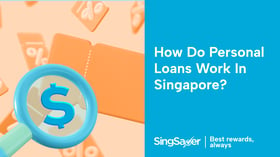When properly used, personal loans are a small expense that can prevent you from falling into larger debt – and even bring you closer to your financial goals.
With effective interest rates of around 7% to 15% per annum, fixed monthly repayment amounts, and a definite repayment tenure, personal loans are a straightforward, affordable, and convenient financial tool.
To better understand how to properly use the various types of personal loans to manage your finances, here are four situations where applying for one can help.
1. When Trying to Get Out of (Credit Card) Debt
Getting a personal loan when you’re trying to get out of debt sounds counter-intuitive. How does borrowing more money help when you already owe a substantial amount?
The answer lies in what type of debt you currently hold. Most heavily leveraged Singaporeans usually grapple with credit card debt, which can be tricky to pay off completely given their high interest rates.
With average credit card interest rates coming in at around 25% per annum (compounded monthly), and minimum repayment at 3% of the outstanding, even a relatively small balance of $5,000 will incur minimum monthly payments of $150 – and that’s just to cover the interest payments. Meanwhile, that $5,000 you owe hardly gets reduced.
Multiply that across two, or three (or more) credit cards and you can see how much money you’ll be wasting just paying off interest charges while getting mired in heavy debt.
If you need to get out of a debt cycle like this, a personal loan can help. This is because personal loans have lower interest than credit cards; a check on SingSaver shows that the effective interest rate (EIR) for a personal loan of $5,000 over 3 years is around 8% per annum.
The solution is this: get a personal loan to pay off your credit cards. This will stop the high interest charges. Then, all you have to do is to pay off your personal loan by following the fixed monthly repayment schedule. Be sure you stay disciplined and do not use your credit cards again until after you’ve paid off the loan.
2. When Offered a Lucrative Opportunity
Let’s say you come across an investment opportunity that offers 8% returns after 3 years. However, the minimum investment amount is $10,000 (which would give you $800 in profits).
You have only $8,000 on hand. If you take a loan for the remaining $2,000, you can participate in the investment to earn $800 at the end of 3 years. The interest you have to pay on your personal loan of $2,000 can be as low as $210 (according to our personal loan comparison tool), which means you’ll end up ahead by $579.
That may seem like a small amount, but never underestimate the power of compounding interest. Successful investors know that even a small sum, under the right circumstances, can go a long way to helping you meet your financial goals.
3. When Your Savings are About to be Wiped Out
Say a family or medical emergency is brewing, and you realise that dealing with the crisis will wipe out all your savings.
While you may be tempted to weather the oncoming storm with whatever resources you have on hand, it would be wiser to get yourself a financial buffer in the form of a personal loan.
Having your savings depleted is a dangerous situation to be in, as the crisis may outlast your savings. Unexpected developments may force you to turn to your credit cards, which will saddle you with high interest rates.
Also, it is far easier to get a bank loan approved if you have cash to put up as collateral. If you wait until you have no savings left (and have maxed out your credit cards), you may find difficulty in getting your loan approved – all of which will compound to make your situation more desperate.
If you find yourself in danger of losing your savings, start shopping for a personal loan instead to help you absorb the financial impact.
4. When You Need to Prevent Your Insurance From Lapsing
Another situation to consider getting a personal loan is when your insurance policy is in danger of lapsing.
Many insurance policies require a long-time financial commitment, and missing your premium payments will result in your policy being terminated. For some plans (such as endowment funds, life policies, and investment-linked policies (ILPs)), this can mean losing part or all of the premiums you have paid previously.
In other words, letting your insurance policy lapse not only removes your protection, it can even cause you to take a financial loss.
You can (and should) prevent this from happening with a personal loan application - especially if your insurance plan is close to paying out its maturity benefits. The amount you need to loan is likely minor, compared to your insurance payout.
However, if your plan is still new, the amount of premiums you have paid out is low. In such cases, starting over with a new policy when you are in better financial straits may be a viable option.
When Should You NOT Consider Taking a Personal Loan
We’ve highlighted 4 situations in which a timely personal loan application can help. The idea is to borrow a little money to prevent a larger debt down the road.
Personal loans are easy to apply for, and their relatively low interest rates make them a useful and manageable financial tool for many Singaporeans. However, that doesn’t mean you should apply for personal loans carelessly.
Here are some situations which you should not be taking out loans for.
- To save a failing business: As difficult as it can be watching your ambitions go down in flames, you shouldn’t take a personal loan to keep your business from going under. This is because business loans and investments can be written off, but you will continue to be individually liable for your personal loan – even if you put it into the business. This can derail your future financial plans.
- To pay for non-essential spending: Taking loans to pay for holidays, expensive furniture, branded goods, and other non-essential spending puts you in debt, which can balloon out of control if you’re not careful. Also, you will be charged late fees (approx. $100) everytime you miss a payment, as well as other financial charges that can outpace your ability to pay off your loan.
- To pay for large-ticket items: If you need to pay for appliances, furniture, and other large-ticket items, taking out a loan may not be the best option. Try instead to use your credit card’s 0% instalment payment plan to spread out your cash outlay, without incurring additional interest charges.
Bottom line
Prudent use of personal loans can save you more in the long run, especially if you're currently saddled with severe credit card debt or are facing a financial emergency that could wipe out your savings. Ultimately, the only way to prevent bad debt from snowballing is to have the discipline to control your spending until your loan is repaid.
If you find yourself in any of the above situations and are looking for a personal loan to help relieve some of your financial burden, here are 3 of the best personal loans in Singapore for you to consider.
What to read next:
5 Ways to Get the Highest Credit Score in Singapore
3 Personal Loans in Singapore with the Lowest Interest Rates
How to Get a Cash Loan From Your Card’s Credit Limit
6 Things To Know About Interest-Free Credit Card Instalment Plans
What’s the Average Personal Loan Interest Rate in Singapore?
 By Alevin Chan
By Alevin Chan
A Certified Financial Planner with a curiosity about what makes people tick, Alevin's mission is to help readers understand the psychology of money. He's also on an ongoing quest to optimize happiness and enjoyment in his life.
Similar articles
How to Get a Personal Loan In Singapore With a Bad Credit Score
3 Ways to Save Money with a Personal Loan
How to Use Personal Loans to Protect Your Cash
Understanding Personal Loans: Why And When Should You Use It?
Should You Pay for Your Wedding with a Personal Loan?
Should You Repay Your Personal Loan Early?
Dos and Don’ts When Getting A Personal Loan
Why You Should Never Say Never with Personal Loans










%20(2).png?width=280&name=CIMB%20Personal%20Loan%20(new)%20(2).png)
